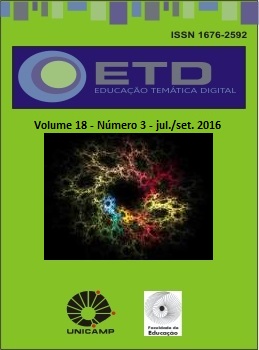Resumo
Foreign language acquisition on the Web and its consequent concerns in respect to its possibilities and limitations have been a major source of contention in the academic and business worlds. However, more importantly, the teaching and/or learning process through the Internet modifies the subjects and the objects involved in the challenges and strategies of foreign language acquisition. This reciprocity of transformations between subjects and objects refers to the idea that the material world is not restricted to a subjective action and that, as well as the subjects involved, the objects are autonomous and have what we can maybe call government or agency. In this way, it is objective of this research, part of the authoress's doctoral thesis, to show that the transfer of the teaching-learning process of foreign languages to the virtual learning environment goes far beyond the mastery of technological tools. It was intended to point out the complexity of introducing the Internet in learning activities. Accordingly, we used the quantitative methods for data collection through closed surveys of German teachers’ attitude and opinion regarding the use of Internet German for educational purposes. The research's results indicated that there is still a persistence in maintaining the established roles despite the belief about the significance of the non-human element in the new context in which they are inserted. In face of that resistance, a mix of false expectations and false results are established, thus producing nothing “new” in a new environment.
Keywords: Internet, foreign language acquisition, new materialism
Referências
BAKHTIN, Mikhail. Marxismo e filosofia da linguagem. 3 ed. Translation: M. Lahud e Y. F. Vieira. São Paulo: Hucitec, 1986.
BRUCE, Miranda. New materialism: framework for the internet of things. Available in: <http://goo.gl/8SSTw9>. Access in: 22 May 2016.
CASTELLS, Manuel. Fronteiras do pensamento. Available in: <http://goo.gl/m03k9B>. Access in: 23 Apr. 2016.
DOLPHIJN, Rick; VAN DER TUIN, Iris Van Der. New materialism: interviews and cartographies. Ann Arbor: Open Humanities Press, 2012. 200 p. Available in: <http://goo.gl/wHTaah>. Access in: 14 June 2016.
KORO-LJUNGBERG, Mirka; CARLSON, David; TESAR, Marek et al. Methodology brut: philosophy, ecstatic thinking, and some other (unfinished) things. Qualitative Inquiry, v. 21, n. 07, p. 612–619. 2015. Available in: <http://goo.gl/jV8fi7>. Access in: 14 June 2016. ISSN 1552-7565.
LEMKE, Thomas. New materialisms: Foucault and the “government of things”. Theory, Culture & Society. 2014. Available in: <http://goo.gl/UPDdpm> Access in: 04 June 2016. ISSN 1460-3616.
ST PIERRE, Elizabeth Adams. The empirical and the new empirism. Cultural Studies ↔ Critical Methodologies, p.111-124. 2016. Available in: <http://goo.gl/UAagf1>. Access in: 10 June 2016. ISSN 1552-356X.
ST PIERRE, Elizabeth Adams; JACKSON, Alecia Y.; MAZZEI, Lisa A. New empiricisms and new materialisms: conditions for new inquiry. Cultural Studies ↔ Critical Methodologies, p. 99-110. 2016. Available in: <http://goo.gl/asvuVA>. Access in: 14 June 2016. ISSN 1552-356X.
TESAR, Marek; ARNDT, Sonja. Vibrancy of childhood things: power, philosophy and political ecology of matter. Cultural Studies ↔ Critical Methodologies, v. 16, n. 02, p.193-200. 2016. Available in: <http://goo.gl/wfCuVL>. Access in: 15 June 2016. ISSN 1552-356X.
YIN, Robert K. Estudo de caso: planejamento e métodos. 2 ed. Porto Alegre: Bookman, 2002. 200 p. Available in: <http://goo.gl/6VIwPT>. Access in: 14 June 2016.
A ETD - Educação Temática Digital utiliza a licença do Creative Commons (CC), preservando assim, a integridade dos artigos em ambiente de acesso aberto.

